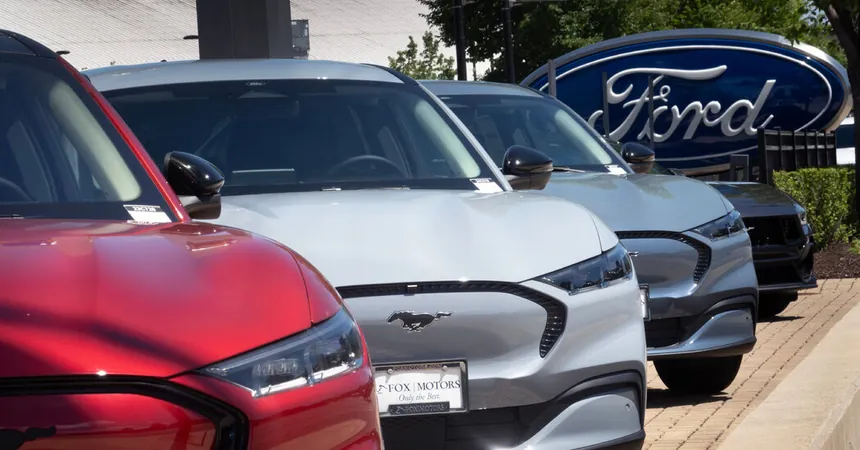
EV Frenzy Drives Automaker Sales to New Heights as 2024 Comes to a Close!
2025-01-03
Author: Ting
Overview of Sales Performance
As 2024 wraps up, automakers have reported a spectacular surge in sales across the United States, largely fueled by a booming demand for electric vehicles (EVs). This unprecedented growth comes as manufacturers roll out more affordable and appealing electric models, drawing in consumers who are eager to transition away from gas-powered cars.
Leading Automakers' Performance
Leading the charge is General Motors (G.M.), which announced a staggering 21 percent increase in fourth-quarter sales compared to the same period last year. G.M. sold over 755,000 cars and light trucks in the final months of 2024, with its electric vehicle sales more than doubling to approximately 44,000 units, securing its place as the second-largest seller of EVs in the market, just behind Tesla.
Ford also saw impressive numbers this quarter, with over 530,000 vehicles sold— a nearly 9 percent increase. The automaker’s transition to electric models is evident as EV sales rose by 16 percent, bringing the total to more than 30,000 vehicles. Other companies, such as Honda and Nissan, reported solid gains of 9 and 10 percent, respectively. However, not everyone has shared in the good fortune; Toyota experienced a dip of 3 percent, and Stellantis reported a decline of 7 percent, showcasing a mixed bag of results in the automotive landscape.
Optimism in the Market
According to Cox Automotive, an auto market research firm, expectations for car sales in 2025 are optimistic, with a projected growth of 2.8 percent, totaling around 16.3 million vehicles. Jonathan Smoke, the firm's chief economist, attributes this positive outlook to rising consumer sentiment, growing wages, and improved loan approval rates. 'The momentum is back on our side as we enter the new year,' he remarked.
Factors Driving EV Sales
Despite earlier concerns about the higher costs associated with EVs and the convenience of charging, consumer interest skyrocketed in the fourth quarter. E.V. sales surged approximately 12 percent, marking a total of 356,000 electric vehicles sold. Factors such as lowered interest rates, enticing incentives, and discount plans have played pivotal roles. Tesla's leasing options, with offers as low as $199 per month for the Model Y, alongside Ford's provision of free home charging stations, are enticing buyers more than ever before.
Impact of Federal Tax Credits
Interestingly, the anticipated change in federal tax credits under the incoming administration has also stirred consumer activity. President-elect Donald J. Trump’s proposal to eliminate the $7,500 federal tax credit for electric vehicles priced under $80,000 has led potential buyers to consider making their purchases sooner rather than later. Jessica Caldwell of Edmunds noted, 'The prospect of losing the tax credit could drive consumers into the market, fearing they might miss out on significant savings.'
Annual Industry Overview
Cox's data reveals that the automotive industry sold just shy of 16 million vehicles in total throughout the year, a 2 percent rise from 2023. G.M. emerged as the top producer with approximately 2.7 million vehicles sold, followed closely by Toyota with 2.3 million and Ford with 2.1 million units.
Tesla's Sales Dynamics
Although Tesla declined to disclose sales by region, estimates suggest a 6 percent drop in U.S. sales for 2024. This slight downturn comes amidst intensified competition in the EV market and the company's first-ever worldwide sales decline. Nevertheless, Tesla's fourth-quarter figures were heralded as a record high for the company, reinforcing its dominant position in the EV sphere.
Conclusion
Overall, automakers set a remarkable trajectory for the future as they pivot more toward electric propulsion, signaling a new era for the automotive industry. With 1.3 million electric vehicles sold in the U.S. — accounting for 8 percent of all new vehicle purchases — the electric revolution is undeniably in full swing, and it’s only gaining momentum. Will 2025 witness even more consumers switch to EVs? Stay tuned, because this electric surge is just getting started!



 Brasil (PT)
Brasil (PT)
 Canada (EN)
Canada (EN)
 Chile (ES)
Chile (ES)
 España (ES)
España (ES)
 France (FR)
France (FR)
 Hong Kong (EN)
Hong Kong (EN)
 Italia (IT)
Italia (IT)
 日本 (JA)
日本 (JA)
 Magyarország (HU)
Magyarország (HU)
 Norge (NO)
Norge (NO)
 Polska (PL)
Polska (PL)
 Schweiz (DE)
Schweiz (DE)
 Singapore (EN)
Singapore (EN)
 Sverige (SV)
Sverige (SV)
 Suomi (FI)
Suomi (FI)
 Türkiye (TR)
Türkiye (TR)